DXP vs Headless CMS – Making the Right Choice
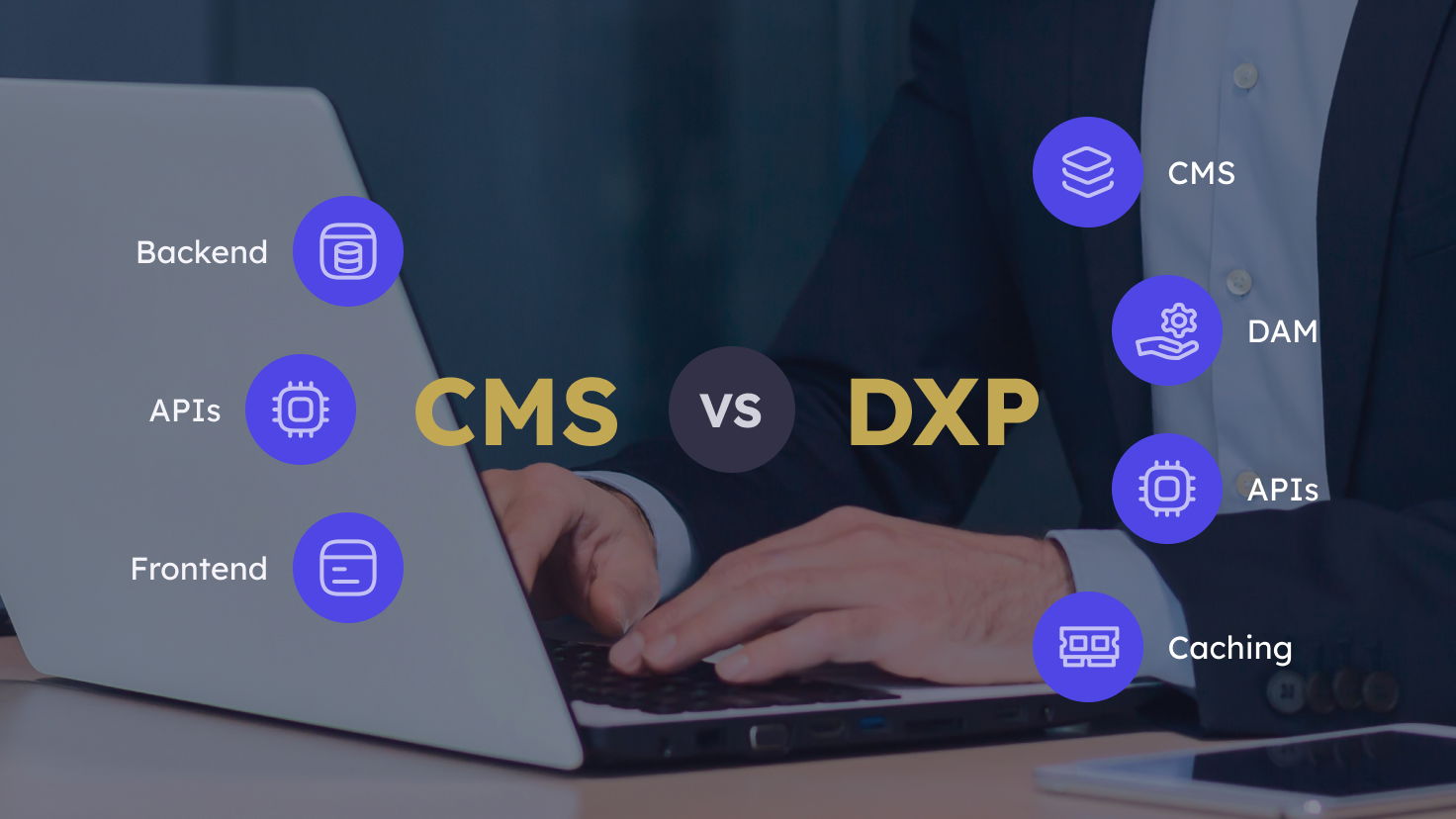
What’s Inside
- What Is DXP (Digital Experience Platform)?
- What Is Headless CMS (Content Management System)?
- DXP And CMS Differences
- Pros & Cons of DXP
- When to Adopt a DXP?
- Pros and Cons of Headless Content Management System
- When To Adopt Headless CMS?
- How Experro Enhances Content Management and Customer Experience?
- Wrapping Up
Key Takeaways
- While DXP and CMS share some similarities, their objectives differ in terms of delivering customer experience.
- A headless CMS focuses on content management, while a DXP encompasses a wide range of objectives.
- DXP and headless CMS both play an integral role in the digital industry to stay relevant and competitive.
- It is crucial to understand which platform to choose between DXP vs CMS to fulfill your business requirements.
McKinsey revealed that 38% of executives plan to invest more in technology to achieve a competitive advantage. In the ever-evolving digital realm, businesses constantly search for that perfect solution to simplify content management and enhance their online presence.
In pursuit of the ideal solution, two dynamic platforms come into play: CMS (Content Management System) and DXP (Digital Experience Platforms). Both have a significant contribution to the way businesses interact with customers. But the pivotal question remains between choosing DXP vs CMS to elevate business growth.
Understanding DXP vs CMS is crucial before implementing one for your business. Therefore, in this article, we will shed light on the difference between DXP vs CMS, their pros and cons, and when to adopt which platform.
But before diving deep into understanding the difference between CMS vs DXP, we must first understand their meanings in detail. So, let’s understand the meaning of DXP.
What Is DXP (Digital Experience Platform)?
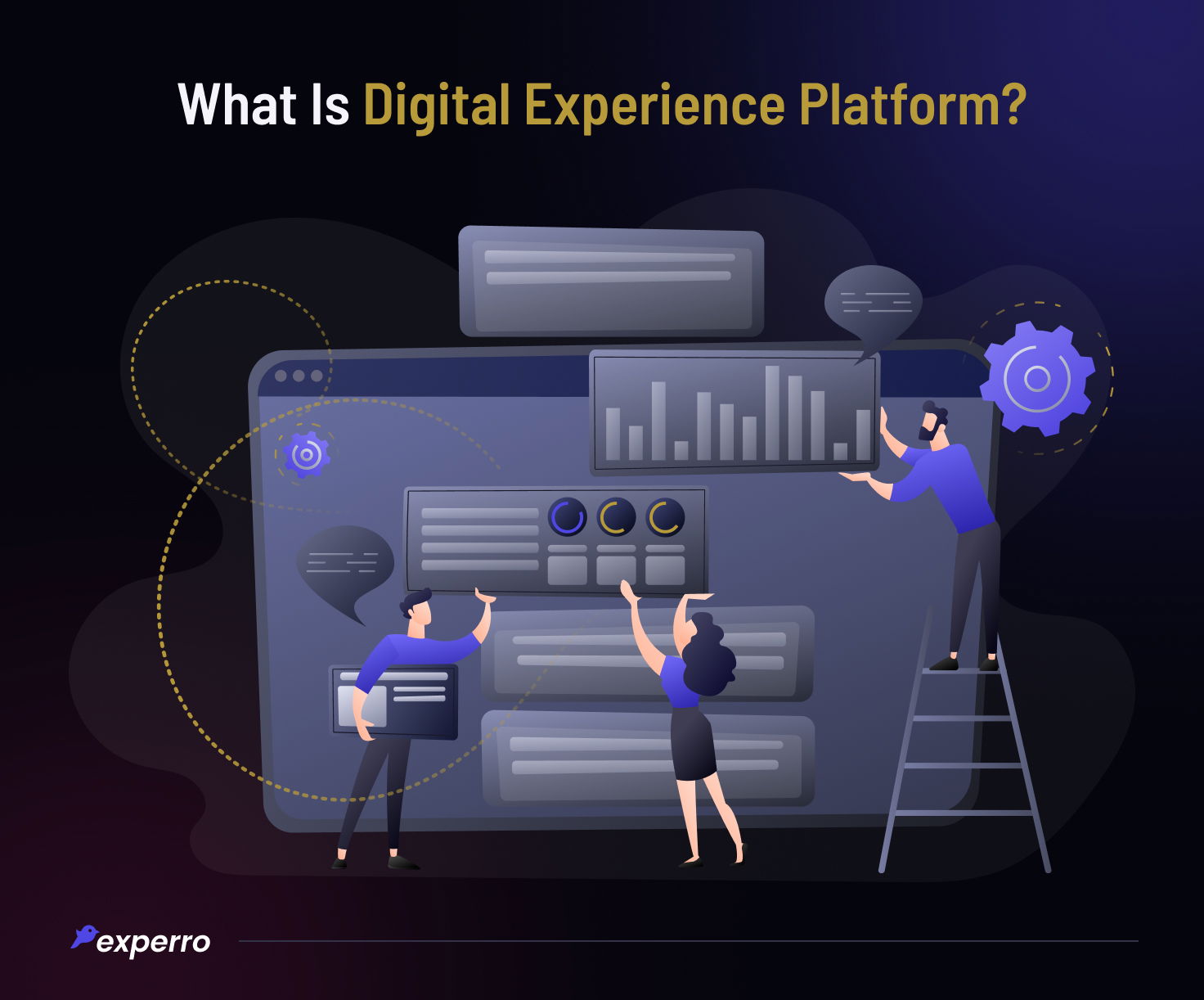
“Delivering content efficiently is not enough; you must also ensure that people find your content relevant and engaging.’’
DXP (Digital experience platform) includes integrated functions to optimize the overall customer experience. It effectively manages website's data with digital asset management. As a result, it empowers businesses to provide contextualized digital experience.
With a broad range of features, DXP services are not just focused on a single purpose but multiple tasks to optimize the customer experience. The features of DXP technologies aim to elevate customer experience. Moreover, DXP technologies enable composable commerce through its comprehensive set of features.
Now that we know DXP meaning in detail let's jump into what's CMS further.
What Is Headless CMS (Content Management System)?
The headless CMS is a content management system designed to create, edit and manage content over multiple digital channels and devices. Discover more about what is headless CMS in our recent guide blog.
The CMS experience streamlines the whole content management process and that makes it different from the traditional CMS option. To gain more perspective about the same, go through headless CMS vs traditional CMS.
Now that we have understood their meanings, let’s move toward the DXP vs CMS overview of the comparison.
DXP And CMS Differences
Both platforms share some similar aspects, so it is often misunderstood as the same concept. But the key difference between DXP vs CMS lies in their prime focus and distinctive features. Let's understand CMS and DXP differences from the table below.
Basis of Difference | DXP | CMS |
|---|---|---|
| Stands For | Digital Experience Platform | Content Management System |
| Focus | Delivering the best possible customer experience. | Simplifying content management and workflow. |
| Function | End to end customer journey. | Effective content creation and publishing. |
| Features | Integrated set of features. | Single application. |
| Cost | Comparatively Expensive. | Comparatively Affordable. |
| Solution | Full suit solution. | Content centric solution. |
| Learning curve | Steep learning curve. | Easy to use system. |
Now that you know DXP vs CMS, let us enlighten you with another most-searched comparison – DXP vs Headless CMS.
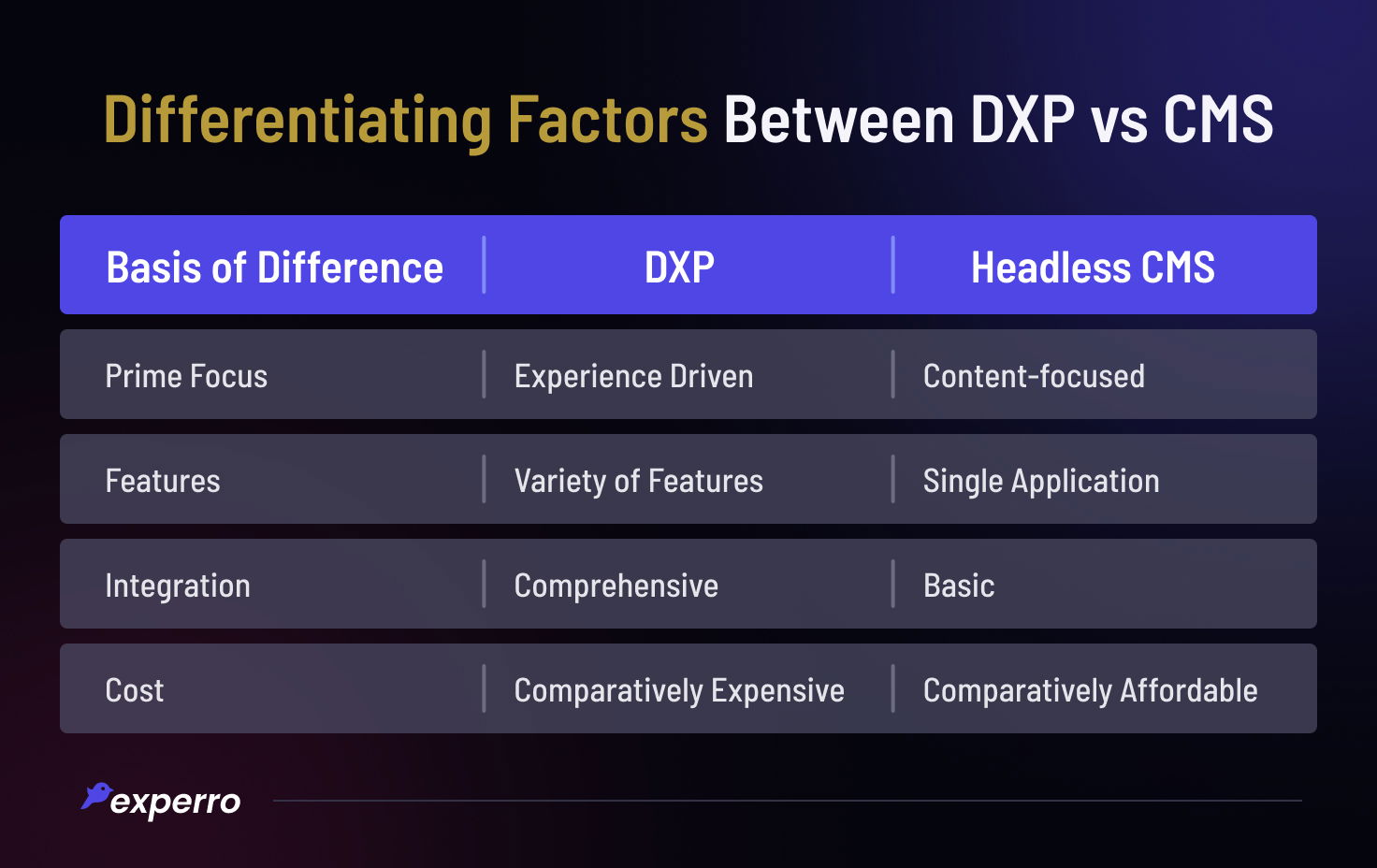
If we compare headless CMS with DXP, we can say that headless CMS is solely focused on content management activities, on the other hand DXP is focused on customer experience.
We hope we have made the DXP vs CMS difference clear. In order to get a detailed perspective on these technologies, it is necessary to evaluate their pros and cons. Evaluating the pros and cons will allow you to make an informed decision.
Pros & Cons of DXP
As we analyzed above in DXP vs CMS, DXP technologies are masters in delivering an amazing experience to its customers with its extensive set of features. Understanding its pros and cons is crucial to make an informed decision.
Pros of DXP
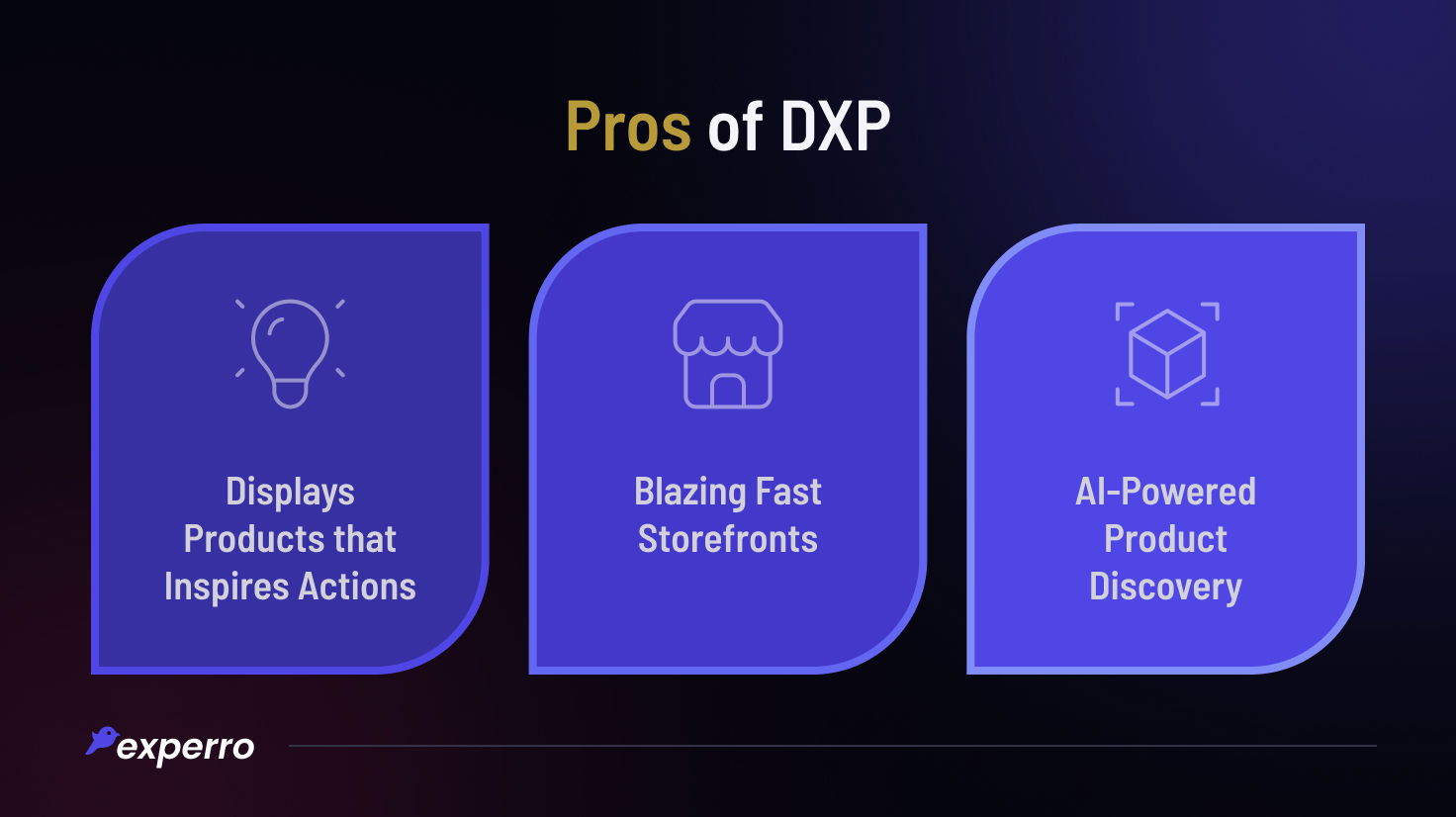
Let’s explore DXP's pros first to identify how DXP can benefit your organization.
Displays Products That Inspire Actions
One of the outstanding features of Digital Experience Platform (DXP) is merchandising. Through merchandising solutions, it enhances product presentation. It displays products in a way that triggers customers to take specific action.
Here, you decide which products to display in the spotlight according to customer needs and interests. It also boosts your specific marketing campaigns to sell particular products.
For instance, as an eCommerce website, displaying festive attires in the spotlight during festive sales is beneficial. That’s a win-win situation for your festival marketing campaign.
Blazing Fast Storefronts
The DXP platform creates a memorable shopping experience with blazing fast eCommerce storefront.
Exploding Topics says that 89% of marketers see a positive ROI when they use personalization in their campaigns. Personalized storefront designs are a great way to engage the audience.
Headless DXP builds beautiful storefronts with high-quality design, intuitive interphase, and fast loading speed. It crafts tailored experience just for your targeted audience.
AI-powered Product Discovery
The AI-powered search enhances the browsing experience of the users. It gives accurate information while users search for products. The intuitive search results reduce customers’ time to find relevant products and improve overall user experience.
Cons of DXP
A customer-centric approach like DXP doesn't have many cons other than the time taken to find the appropriate one for your company.
Time-Consuming To Find the Best Fit
There is a plethora of options available in the market if you want to adopt a DXP platform. Finding the best fit for your business may take time. But when you finally find it, your strategies skyrocket in the market.
When to Adopt a DXP?
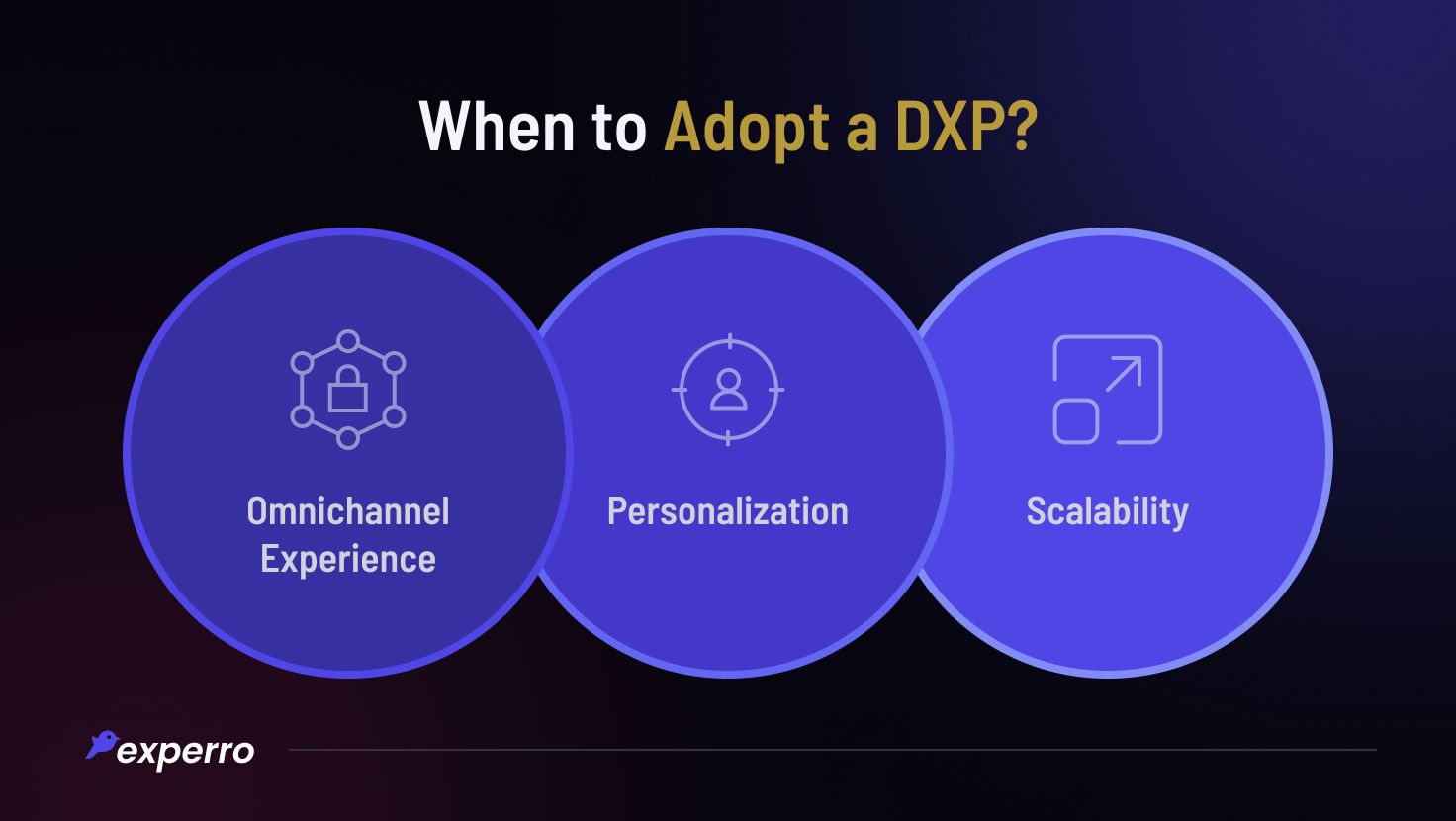
The differences between CMS vs DXP throw light on their distinct utility for various business needs. The DXP platform can be implemented across a wide range of sectors within the digital landscape. However, for many organizations, DXP can become a catalyst that brings about desired results.
Let’s explore when to adopt DXP architecture.
Omnichannel Experience
If your business already operates on multiple digital touchpoints such as websites, social media, mobile apps, and IoT devices or you want to implement an omnichannel strategy in the future, then you should defiantly adopt DXP. Moreover, it boosts digital marketing strategies by providing an omnichannel experience to customers.
Personalization
If you want to pave the way by providing personalized customer interaction, DXP platforms can work like the cherry on the cake. Personalization and customer experience is the new battlefield for customer-centric businesses such as eCommerce.
Scalability
When your business expands rapidly, scalability becomes the most important factor. Handling increased traffic, transactions, and products and ensuring consistent content delivery is necessary. So, if your business is expanding or you have predicted its future growth potential, then you must go with a DXP.
Pros and Cons of Headless Content Management System
Like every other system, headless CMS also has its pros and cons. Let’s explore each one of them to understand it better.
Pros of Headless CMS
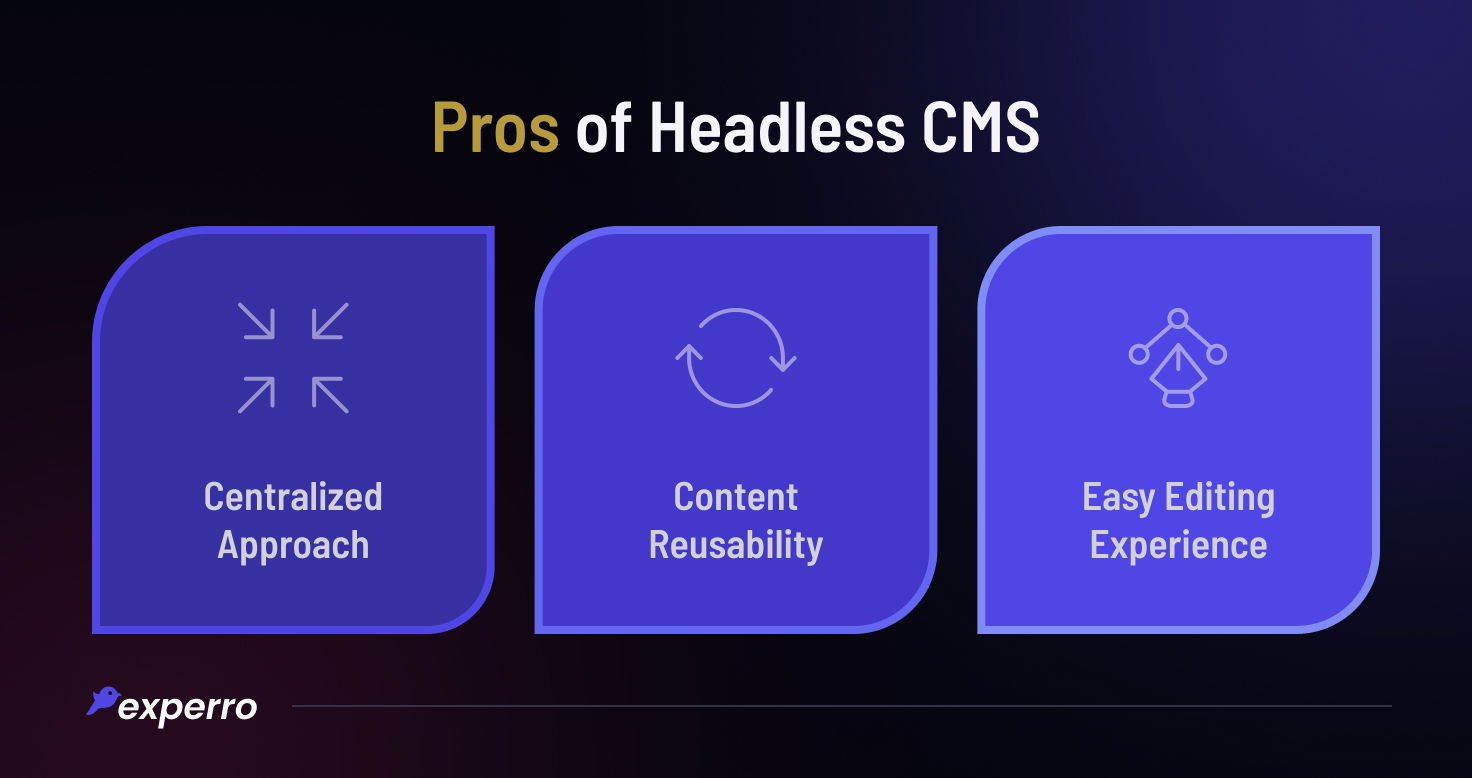
Headless CMS (Content Management System) has gained popularity for its flexibility and benefits over traditional monolithic CMS solutions. Here are some of the pros of headless CMS:
Centralized Approach
A headless CMS is a centralized content repository for all your content needs. Content stored in one place enables smooth workflow, easy accessibility, and enhanced team experience.
Everything is unified in one content repository, from blogs to product information to images. Say goodbye to cluttered content and hello to classified and highly organized content repository with the finest headless CMS platform.
Content Reusability
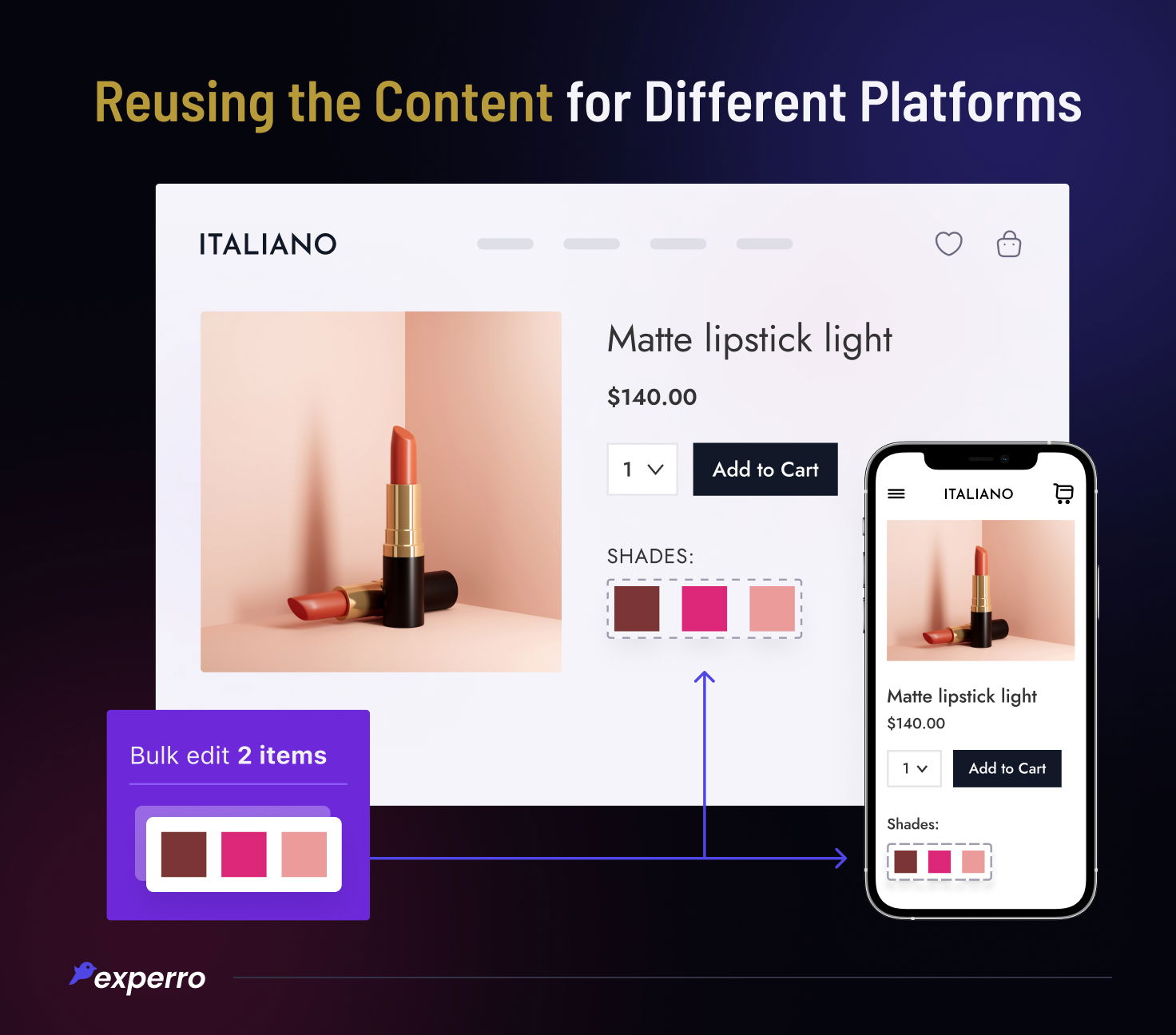
It's the era of cross-functional and multichannel content delivery. Customers want seamless integration on mobile devices, desktops, tablets, etc. By opting for headless CMS, you can eliminate the need for repetitive content creation.
Create content once and use it multiple times over the internet. Content reusability totally fulfills the omnichannel experience needs.
Whether it’s a website, digital boards or mobile applications, headless CMS has got you covered with content reusability benefits on multiple devices.
Easy Editing Experience
Headless CMS solutions offers a separate architecture. It completely separates the frontend (Presentation layer) from its backend (Content Library). That’s the difference between CMS vs headless CMS.
This greater level of separation allows developers to edit and publish content without the need for coding. Headless CMS provides even more benefits than decoupled CMS. To find out more about it, check out headless vs decoupled CMS.
Cons of Headless CMS
While headless CMS offers several advantages, it offers drawbacks for organizations not ready to adapt to change quickly.
Not Made for Change-Resistant Organizations
Headless CMS is a new age-concept that perfectly fits the modern digital industry. It typically requires a shift mindset and workflows. Those organizations who are resistant to change and adapting to new technologies may struggle. This can also involve learning new technology, providing training and resources to a team and reorganizing the system.
When To Adopt Headless CMS?

Whether to adopt a headless CMS depends on your content management needs and strategies. If your organization aligns with the following requirements, you should consider adopting headless CMS.
Flexibility
If your organization requires publishing content frequently, then you may prefer flexible content delivery. In a large amount of data, it becomes difficult to edit and manage content seamlessly.
Localization And Translation Support
According to WebinarCare, businesses that invested in translation were 1.5 times more likely to observe an increase in revenue.
If your business operates globally and requires you to deliver content in multiple languages. CMS ensures efficient content delivery to a diverse audience. Facilitates multiple language translation and simplifies translation workflows.
Team Collaboration
Team collaboration enables enhanced creativity and efficiency with diverse ideas. CMS enables easy workflow and collaboration if your business has a huge team, like content writers, editors, and designers. It allows editing and managing content in real-time with robust security.
Interesting Read! - Guide on Content Experience Platform
How Experro Enhances Content Management and Customer Experience?
Finally, it's time to explore a unified platform that serves as a solution to your DXP vs CMS battle.
Experro is a remarkable Digital Experience Platform that includes various digital products that can enhance your business. Its headless CMS helps to streamline your content management needs and enables easy workflow between team members.
With remarkable analytics features, it gathers actionable customer insights. Moreover, Experro also offers personalization, eCommerce merchandising, AI-powered search, and many more features to elevate the customer experience.
Wrapping Up
The differences between DXP vs CMS are widely discussed. But we would say it is not the battle of DXP vs CMS but leveraging these technologies to elevate the customer experience.
Customer expectations are increasing rapidly in the fast-paced digital environment. Therefore, content management and customer experience are two such factors that cannot be ignored to achieve a competitive advantage.
If you want to achieve a competitive advantage and experience unparalleled growth in your business journey, get in touch with the team at Experro!
FAQs


Priya Zala
04 July 2023Through her writing, she has a lovely way of capturing users' pain points and delivering solution-oriented content. Her writing is sure to captivate readers and leave them with a lasting impression. When not crafting content, Priya enjoys getting lost in a good work of fiction, which soothes her soul.